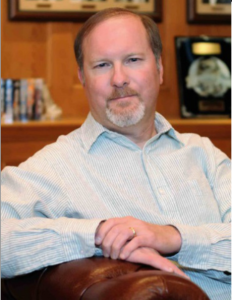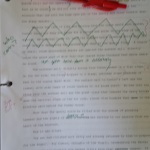 Most non-writers, and many new writers, have no idea that finishing that manuscript and typing END is anything but the end. I know when I started writing, I couldn’t see beyond reaching that final scene. Of course, that first novel was a 300,000 word monstrosity that took me over two years to complete, but the principle is universal.
Most non-writers, and many new writers, have no idea that finishing that manuscript and typing END is anything but the end. I know when I started writing, I couldn’t see beyond reaching that final scene. Of course, that first novel was a 300,000 word monstrosity that took me over two years to complete, but the principle is universal.
The first draft is not the final draft.
That truth is even more daunting when we consider how few wannabe writers actually reach the end of their first draft. Of those who do, many lack the determination to see the project to its full completion.
It’s easy to assume the tragic artiste pose and proclaim in an awful imitation of an accent from some European country, “This is my Art and the muse must be honored. The words were given to me like this for a reason.”
Not if you want to sell it and actually have someone read it.
This becomes the dividing line between those who like dabbling in writing as an enjoyable hobby and those who are serious about becoming a Writer as a career.
Some first drafts are pretty good, but pretty good isn’t enough. Every successful author I know recognizes they will need to make several editing passes through each novel before it’s ready. One of the reasons we’re encouraged to write what we love is because if we don’t LOVE our stories enough to work through them at least half a dozen times, we’re going to HATE them before the process is complete.
Many new authors don’t understand this and unfortunately in today’s ebook world, it’s all too easy to complete that first draft and throw the book right up on Amazon.
I for one have read some of those stories. After wading through the piles of novels that make me cringe when I look at the cover or read the first page, I’ve selected one that looked like it had real promise. Many times those ebooks turn out to be pretty decent, maybe have a great concept and tons of potential, but where the author wasn’t patient enough to really finish the work.
I find it tragic when I complete an ebook like that. When I think, “You know, that could have been a really good book. But it was only about 90% finished and needed more polishing.”
What a waste.
Not only of my time, but of the author’s time. They worked so hard bringing that novel to life, only to not put in the effort to get it that last 10%. It’s like Frankenstein stitching together the perfect monster only to not bother raising it up on the platform during the lightning storm. That last 10% is what infuses the story with it’s real life.
That’s one of my fears: that my novels won’t be ready.
I cringe when I think back to my first monstrous novel. With how little I knew about the industry, about editing, I was convinced it was a great work and totally ready to go. Had the ebook revolution already been underway, I probably would have self-published it.
I would have destroyed that story.
I’m glad I didn’t have that option and that the dozens of rejection letters finally clued me in that there was something missing. I’ve since thrown that novel away and rebuilt it from the ground up. The resulting story is ten times better and is one of the eight books I’m preparing for publication in my upcoming “Eight Books in Eight Months” publishing blitz.
Before I pull the trigger on those novels though, I’ve dedicated the time to rewrites, I’ve gathered honest feedback from beta readers, and I’ve worked with professional editors (including Joshua Essoe and Evan Braun) to make sure they’re really ready.
Even so, I still have to wonder, are they really?
This time I feel a lot more justified in saying, “Yes.”

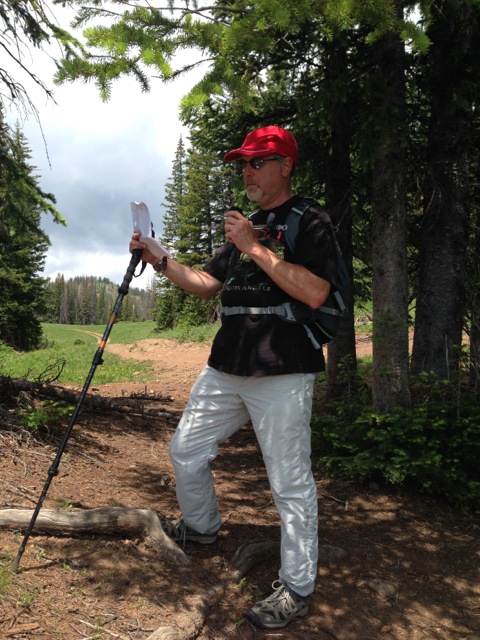 I write and publish four or more novels a year, and my creative office doesn’t have either a computer or a desk. It also doesn’t have the distraction of a constantly ringing phone, an endless succession of emails that need to be responded to (or marked as spam), doorbells to be answered with the latest UPS package of cat food from amazon prime (and the related distraction of cats who want me to feed them that food), or employees or family members who lie by assuring me “this will only take a minute.”
I write and publish four or more novels a year, and my creative office doesn’t have either a computer or a desk. It also doesn’t have the distraction of a constantly ringing phone, an endless succession of emails that need to be responded to (or marked as spam), doorbells to be answered with the latest UPS package of cat food from amazon prime (and the related distraction of cats who want me to feed them that food), or employees or family members who lie by assuring me “this will only take a minute.”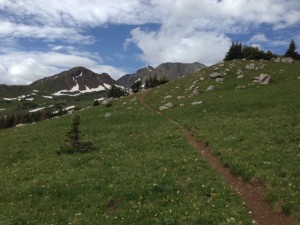 I have so programmed myself to write this way that now I find it very frustrating to sit my butt in a chair and stare at a screen for hours on end. When I’m walking, I am inspired by the landscapes in my beautiful Colorado. It may not be a genuine alien world, but I can imagine that—and all without the constant real-world distractions that harass a writer cooped up in a home office.
I have so programmed myself to write this way that now I find it very frustrating to sit my butt in a chair and stare at a screen for hours on end. When I’m walking, I am inspired by the landscapes in my beautiful Colorado. It may not be a genuine alien world, but I can imagine that—and all without the constant real-world distractions that harass a writer cooped up in a home office. The scenery itself is often inspirational, and when possible I try to be in a place that reminds me of what I’m writing. I’ve spent a lot of time in the Great Sand Dunes National Park in Colorado or Death Valley in California as I write my Dune novels with Brian Herbert; I’ve been in a snowstorm in the Sierra Nevada mountains while writing about Han Solo and Princess Leia on the polar icecap of a planet, and I spent time hiking around the Anasazi cliff ruins of Mesa Verde while writing about derelict alien cliff ruins in my Saga of Seven Suns.
The scenery itself is often inspirational, and when possible I try to be in a place that reminds me of what I’m writing. I’ve spent a lot of time in the Great Sand Dunes National Park in Colorado or Death Valley in California as I write my Dune novels with Brian Herbert; I’ve been in a snowstorm in the Sierra Nevada mountains while writing about Han Solo and Princess Leia on the polar icecap of a planet, and I spent time hiking around the Anasazi cliff ruins of Mesa Verde while writing about derelict alien cliff ruins in my Saga of Seven Suns.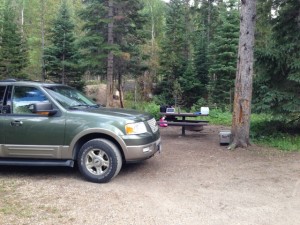 But sometimes I extend the getaway into a camping trip, so that I can really move my working office onto a picnic table out in a beautiful National Forest site. That’s where I’m writing this, sitting at a table under a lodgepole pine tree at a perfect campsite next to a river 85 miles up the Cache la Poudre canyon in northern Colorado. An extra battery for the laptop, and no internet connection, a growler of my favorite microbrew beer: It’s the perfect office, alone in the forest (except for a moose visitor who just walked through the campground), away from it all where I can concentrate on being in the worlds inside my head. It’s like taking a vacation in an exotic place with my imaginary friends.
But sometimes I extend the getaway into a camping trip, so that I can really move my working office onto a picnic table out in a beautiful National Forest site. That’s where I’m writing this, sitting at a table under a lodgepole pine tree at a perfect campsite next to a river 85 miles up the Cache la Poudre canyon in northern Colorado. An extra battery for the laptop, and no internet connection, a growler of my favorite microbrew beer: It’s the perfect office, alone in the forest (except for a moose visitor who just walked through the campground), away from it all where I can concentrate on being in the worlds inside my head. It’s like taking a vacation in an exotic place with my imaginary friends.